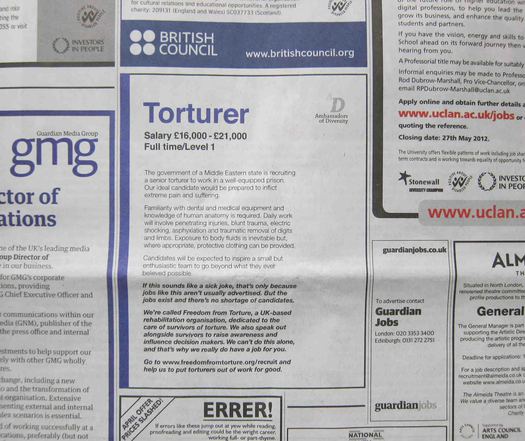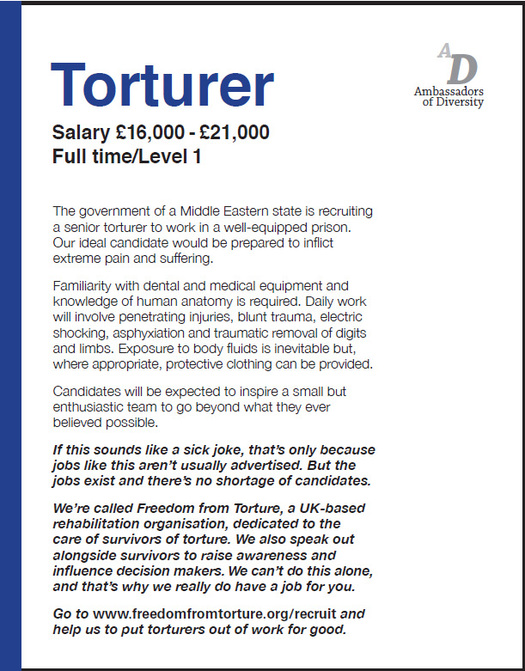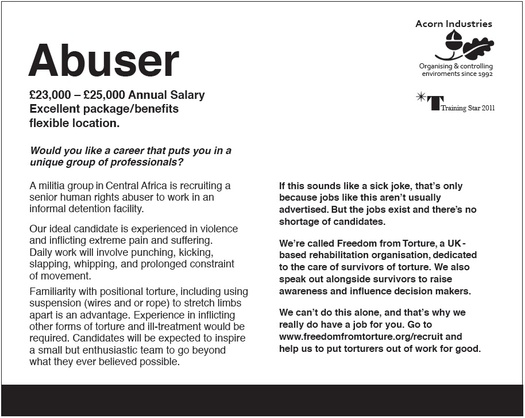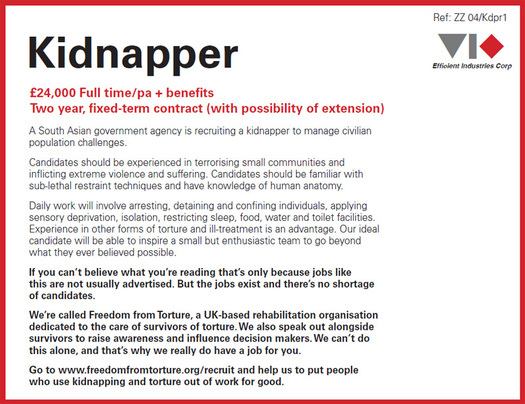
Recruitment ads, Guardian newspaper, 30 April 2012
I was browsing the Guardian newspaper’s recruitment ads this week when I saw this ad for a job as a Torturer. It caught me off guard — as it was meant to — and I felt a few seconds of profound shock and dismay. The Guardian, or indeed any reputable paper, was the last place one would expect to see such a repulsive announcement, and yet there it was.
“The government of a Middle Eastern state is recruiting a senior torturer to work in a well-equipped prison. Our ideal candidate would be prepared to inflict extreme pain and suffering.”
As the copy continues, it gets worse: penetrating injuries, blunt trauma, electric shocks, exposure to bodily fluids. The language is calm, descriptive, exactly like any other recruitment ad: “Candidates will be expected to inspire a small but enthusiastic team . . .”
Then, just over half way, it becomes clear that this is a message from a UK-based organization, Freedom from Torture, which cares for survivors from around the world. I know this remarkable charity well. I’m a supporter. Until last year, it was called the Medical Foundation for the Care of Victims of Torture. On the opposite page, I notice a similarly styled ad: “Abuser. Excellent package/benefits, flexible location.”
Advertising Torture campaign by Ogilvy & Mather for Freedom from Torture
The three ads in Freedom from Torture’s new awareness and fundraising campaign deliver perfectly calculated moments of cognitive dissonance. By normalizing the idea of torture as an everyday line of work, a sought-after job (“there’s no shortage of candidates”), and simply listing what the position requires in eminently ordinary business language, they provide a sickening reminder of the reality of torture in many parts of the world. And the ads aren’t shy of naming some abuse-prone territories: the Middle East, Central Africa, and South Asia. The blandly upbeat names and logos — Acorn Industries, Ambassadors of Diversity — are a sardonic touch.

Advertising Torture campaign by Ogilvy & Mather for Freedom from Torture
Freedom from Torture’s campaign was developed in collaboration with staff from the Ogilvy & Mather advertising agency, who gave their services pro bono, out of commitment to the charity’s work. Mimicking recruitment ads is an audacious and impressively risky strategy. Instead of aiming as widely as possible, the campaign limits itself to a much narrower group of potential respondents. (The ads have also appeared in the UK’s Independent newspaper.) As a means of gaining attention, though, and compelling browsers to read, the ads are far more effective than the routine, all-too-ignorable device of distributing charity leaflets in magazines. Readers who feel inspired to support Freedom from Torture can visit the site and make a donation.
The ads are a sophisticated form of détournement that works by subverting an existing channel of communication. There must be plenty of other platforms that could be infiltrated in similarly imaginative ways and used to capture attention for positive purposes.


Comments [1]
09.29.12
08:58